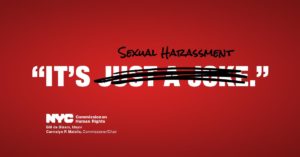 Since the allegations of sexual harassment and assault against Hollywood producer Harvey Weinstein became known in the Fall of 2017 the nation has begun a long overdue process of discussing and addressing workplace harassment. Though the grassroot efforts of the #Metoo and #Timesup movements keep the conversation in the public eye, it is important for employers and employees alike to have a clear set if guidelines. As such, New York State recently passed a group of new provisions to fight sexual harassment in the workplace.
Since the allegations of sexual harassment and assault against Hollywood producer Harvey Weinstein became known in the Fall of 2017 the nation has begun a long overdue process of discussing and addressing workplace harassment. Though the grassroot efforts of the #Metoo and #Timesup movements keep the conversation in the public eye, it is important for employers and employees alike to have a clear set if guidelines. As such, New York State recently passed a group of new provisions to fight sexual harassment in the workplace.
- Requirements for state contractors (Takes effect 1/1/2019)
- All state contractors must submit an affirmation that they have a sexual harassment policy and that all their employees are trained and versed in it.
- The following statement must be included when a competitive bid is required “By submission of this bid, each bidder and each person signing on behalf of any bidder certifies, and in the case of a joint perjury, that the bidder has implemented a written policy addressing sexual harassment prevention in the workplace and provides annual sexual harassment prevention training to all of its employees. Such policy shall, at a minimum, meet the requirements if section two hundred one-g of the labor law.”
- The above statement is left at the discretion of the department, agency, or official if competitive bidding is not required.
- Employers are prohibited from using mandatory arbitration provisions in employment contracts in relation to sexual harassment complaints unless inconsistent with federal law.
- Nondisclosure agreements can only be used when the condition of confidentiality is the preference of the victim.
- All employers must establish sexual harassment prevention policies and training programs.
- The Department of Labor and the Division of Human Rights will develop a model policy and training program that will be posted on their websites.
- This model will serve as the minimum standard level that employers must match or exceed.
- Sexual harassment policy must be provided in writing to all employees.
- Sexual harassment prevention training must be provided annually.
- Protections for non-employees in the workplace. Non-employees include contractors, subcontractors, vendors, consultants, or other service providers.
- It will be unlawful discriminatory practice for any employer to look the other way when non-employees in the workplace are being sexually harassed when the employer knew or should have known about sexual harassment.
Some of the above provisions take place immediately while others will take effect 90 or 180 days after becoming law. There are provisions relating to public officials as well. New York City has also passed legislation relating to sexual harassment training, education, and expanding rights for victims. Frankly, as soon as the #Metoo movement picked up steam management and/or human resources should have run through company sexual harassment policy and made changes if the policy seemed weak. It should now be clear to everyone that sexual harassment isn’t a joke and should not be treated as one.
Leave a Reply